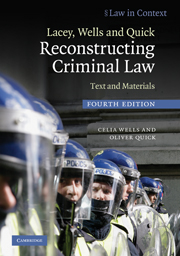Book contents
- Frontmatter
- Contents
- Preface
- Table of cases
- Table of statutes
- Section I Approaching Criminal Law
- Section II Law, Order and Security
- 4 Social and Political Constructions of Disorder
- 5 Securing Order
- 6 Public Order
- 7 Criminal Law and Justice
- Section III Interpersonal Violence; Drugs and Alcohol Abuse; Offence Preparation and Participation
- Section IV Property and Propriety
- Section V Regulating Sexuality and Bodily autonomy
- Section VI Making a Killing
- Bibliography
- Index
- References
7 - Criminal Law and Justice
Emerging Themes
from Section II - Law, Order and Security
Published online by Cambridge University Press: 05 June 2012
- Frontmatter
- Contents
- Preface
- Table of cases
- Table of statutes
- Section I Approaching Criminal Law
- Section II Law, Order and Security
- 4 Social and Political Constructions of Disorder
- 5 Securing Order
- 6 Public Order
- 7 Criminal Law and Justice
- Section III Interpersonal Violence; Drugs and Alcohol Abuse; Offence Preparation and Participation
- Section IV Property and Propriety
- Section V Regulating Sexuality and Bodily autonomy
- Section VI Making a Killing
- Bibliography
- Index
- References
Summary
Territory, technology, youth
Territory
While the separation between private and public spheres of activity was never as simple as it sounded, we have recently witnessed a rapid decline in the availability of public space, and increasing modes of surveillance (CCTV) both in public streets and in ‘private’ public areas such as shopping malls and leisure facilities. The concern with surveillance and controlling citizens' activities is seen in our discussion of the array of harassment offences and of regulatory techniques such as the anti-social behaviour order, child curfews and the planned introduction of identity cards (Identity Cards Act 2006). Two distinct types of ‘threat’ to order can be identified. One type – perhaps the one that springs to mind when the term ‘public order’ is used – encompasses those threats that arise during specific protests or gatherings such as political demonstrations or sporting events. The second type arises more frequently but in far less organised circumstances from the eruptions of groups of people – often young, often drunk – from pubs and clubs on Friday and Saturday nights. There is then a blurred line between ‘public order’ in the traditional sense of groups on the streets (which may or may not be pursuing political aims), and ‘keeping streets orderly’ (which informs much recent legislation) through control of those thought to threaten the peace and quiet of the community. That this is an artificial division is exacerbated by the tendency for laws passed for one purpose to be appropriated for another.
- Type
- Chapter
- Information
- Lacey, Wells and Quick Reconstructing Criminal LawText and Materials, pp. 198 - 230Publisher: Cambridge University PressPrint publication year: 2010

